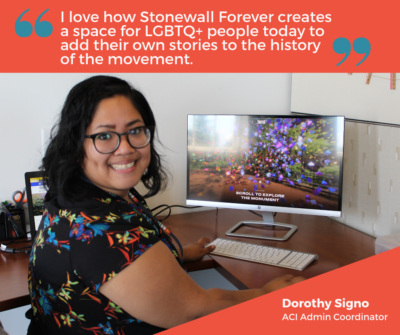On any given week at A Way Home Washington, we’re sharing reading and viewing recommendations with each other that keep us inspired and make us think. From reports that deepen our understanding of youth and young adult homelessness to videos that broaden our perspective, our staff is always eager to learn. We thought we’d share some our favorites with all of you each month! And we’re always looking for new recommendations – what’s on your reading list this month?
 Dorothy’s Pick: Stonewall Forever
Dorothy’s Pick: Stonewall Forever
Stonewall Forever is an interactive site that tells the history of the LGBTQ+ rights movement and continues into the present. Collections of videos tell stories about crucial moments before, during and after the Stonewall Riots, and visitors can add their own stories and experiences. The monument’s living, evolving nature honors the activists that started the movement and reminds us that our journey towards LGBTQ+ equity continues.
Jim’s Pick: Chapin Hall “Missed Opportunities” Report
The “Missed Opportunities in Youth Pathways Through Homelessness” report draws insights from the 215 in-depth interviews conducted by Chapin Hall as part of the Voices of Youth Count project. The report highlights the intersection of personal, relational and structural conditions that contribute to a young person’s path to homelessness and identifies key policy changes that can help address these critical conditions early on to prevent homelessness. The personal narratives woven through the report remind us that behind each data point, there is a young person who needs our support.
Liz’s Pick: Abigail Echo-Hawk on the art and science of ‘decolonizing data’
Data that marks Native Americans and Alaska Natives as “not statistically significant” or lumps these communities together with other racial groups contributes to the erasure of indigenous peoples. Echo-Hawk says it best: “When we are invisible in the data, we no longer exist.” The community needs to be involved in data collection, including deciding how the data will be gathered and how it will be used, for data to serve the community. This principle underscores why co-creating initiatives with young people with lived experience is critical to our work – and why we must continuously ask ourselves who is not at the table to fill those gaps.
Sully’s Pick: 21-Day Racial Equity Learning Challenge
Grounding our work in equity requires a commitment to ongoing and continuous learning. This list of 21 articles and videos is a great way to incorporate learning and reflecting about racial equity into our daily routines. The topics range from explanations of fundamental concepts like unconscious bias to actionable guidelines for confronting racism in our daily lives, and touch on both interpersonal and systemic racism.

Leave a Reply